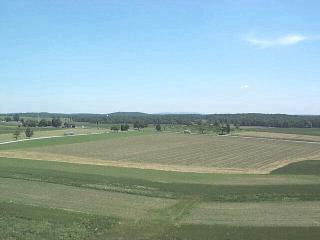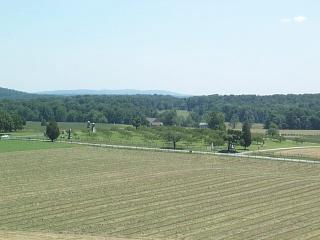

 Major General Daniel E. Sickles, commander of the Federal Army's Third Corps, had sent messages to army headquarters that morning with his concern about the left of his line being unsupported and did not get a satisfactory response. At 10:00am Sickles went to see Meade at the commanding general's headquarters and informed him that his ordered position was not the best ground for defense and requested that he deploy on the higher ground west of his assigned location. Meade's response was ambiguous at best, "Certainly, within the limits of the general instructions I have given you; any ground within those limits you choose to occupy, I leave to you." There may have been several factors that played in Meade's mind as to why he had not paid much attention to Sickles's requests. There was a large force of Confederates on his right that were plainly visible, early in that day Meade had considered attacking them but was informed that the ground was too broken in that section of the battlefield to make a successful attack. Meade was certainly preoccupied with his right, according to HISTORICUS said of Sickles and the left of his line, "O, generals are all apt to look for the attack to be made where they are." Meade it seems did not have much use for Sickles as a person, let alone as a corps commander. This likely stems from the time that Hooker was in command of the Army of the Potomac. Hooker and Sickles became great friends after Sickles came under the former's command. There were always loose women (how do you think that they got the name hookers?), card games, and booze at Hooker's headquarters. Sickles was not known for being virtuous and was likely spending as much time as he could at his good friend's, the commanding general's, headquarters. This kind of activity was something that "Old Snapping Turtle" Meade did not approve of. Meade wrote of the situation in a letter to his wife in late January 1863 while then in command of the 5th Corps: "As to Hooker, you know my opinion of him, frequently expressed. I believe my opinion is more favorable than any other of the old regular officers, most of whom are decided in their hostility to him. I believe Hooker is a good soldier the danger he runs is of subjecting himself to bad influences, such as Dan Butterfield and Dan Sickles, who, being intellectually more clever than Hooker, and leading him to believe they are very influential, will obtain an injurious ascendancy over him and insensibly affect his conduct." In February Meade wrote that "such gentlemen as Dan Sickles and Dan Butterfield are not the persons I should select as my intimates, however worthy and superior they may be." Meade may also have been a bigot what it came to those who made it to high rank and did not attend West Point, as Meade had done and Sickles had not. Sickles believing that he was getting no where fast with his commanding general asked for someone from Meade's staff to come and look at Third Corps assigned position. Meade sent General Hunt with the instructions, "Will you visit General Sickles and see what he has in mind?" Hunt agreed with Sickles that this proposed line, running along the Emmitsburg Road from the Codori barn south to the Peach Orchard then turning ninety degrees to the east and running along the top of the heights back to the Devil's Den, had many advantages. Artillery could dominate the field which they couldn't do in the lower ground where they had been assigned. This was especially true along the left of Sickles proposed line, for it would be an excellent location for Confederate artillery. But Hunt had some concerns about this location. It would be 500 yards in front of the Second Corps and something would have to be done so that the two corps could stay in contact. The length of the line would be three times the length that Third Corps would hold on its ordered position on Cemetery Ridge. It would likely take all of the Third Corps, it's reserves, as well the Fifth Corps which was currently acting as the Army's reserve, to adequately fill this proposed line. Hunt could not recommend it until the Sixth Corps was up and available to replace the Fifth as the reserve.  The Peach Orchard A closer viewAs Hunt prepared to leave Sickles asked if he should advance the Third Corps. "Not on my authority," Hunt said shaking his head, "I will report to General Meade for his instructions." About this same time Buford's cavalry was ordered to Westminster to refit and assist in guarding the army's trains. This was done because of the hard fighting that Buford's troopers has done the day before. HISTORICUS wrote that Sickles was surprised by this and believed that with the cavalry's departure his left was even more exposed. Sickles through couriers protested to Meade. Meade replied that it was not his intention to withdraw the cavalry and some part of it would return. Even though Meade's staff sent out those orders, no cavalry ever appeared on Sickles' left. | ||
 |
 |
|